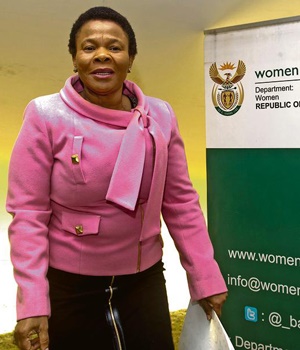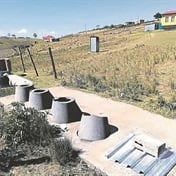
Dumisane Lubisi spoke to Susan Shabangu, minister in the presidency responsible for women.
Your ministry is just over a year old. What have you achieved?
I came into a department that had various challenges, but I also had to change its mandate. There was insufficient capacity and no clear focus of expertise in the area of dealing with female issues and the socioeconomic challenges facing women today.
We had to refocus the way we dealt with the issue of gender-based violence.
We are looking at issues in the economic space, ensuring that the financial inclusion of women is part of our programme. We are going to Cabinet soon to make sure that all departments have gender focal points. We will also be dealing with gender- responsive budgeting by governments to ensure they respond to women’s issues in their departments.
What is the biggest challenge facing South African women today?
The eradication of poverty and inequalities in our society are our biggest challenge. In the economic space, you still find women are being pushed back. The issue of poverty is the biggest challenge because, as you know, it makes women vulnerable in terms of abuse and violence. Key to the issue is making sure that the girl child’s life changes for the better by making sure she is educated, is skilled and being trained so she can take her rightful place in society.
Employment equity numbers show that women are still marginalised in corporate South Africa. What are you going to do about this?
We are going to engage all the institutions and put our frameworks and mechanisms in place to make sure they fast-track transformation. Not to fast-track on the basis of numbers, but to do it in a qualitative manner. It must mean the right training must be given to women. Access must be created for women to advance their interests. We have the monitoring evaluation section in the department, which will, on a continuous basis, monitor and ensure that we assess whether the progress is sustainable.
Has gender violence become the norm and is eliminating it a pipe dream?
This kind of issue, like the story you’re telling me [a Daily Sun article about a man who cut off his partner’s genitals], is a reflection of a society that is deeply sick. This is why we are in partnership with men because we can’t deal with abuse or violence against women only with the women. We’ve got to bring the perpetrators on board.
We work with partners like religious leaders to really get to the root of why we have bitter men who look at women as the people they vent their anger on. We will be going on a nationwide campaign to understand the society we are living in and find out what makes men become so brutal and evil.
Do you believe your department is better placed in the presidency?
We are not a desk. By being in the presidency, I would say it is the most strategic area.
What it does is to give you the authority to play an oversight role in government departments and society as a whole.
So that’s what makes us better placed there because we’ve been positioned and elevated in a space where we can have an eye on everybody and ensure that the whole society changes.
The department tweeted a question recently that asked what should be done to women who withdraw cases against their abusers. Is this not revictimising the victims of abuse?
We need to look at the tweet in a broader context.
It was a reflection that there is still a deep-rooted patriarchy in our society, but it also shows that we have not moved into a space where women are independent and fully confident when it comes to taking their issues forward.
So what we need as society is to make sure we continue to talk about awareness and also work to make sure women have confidence in themselves, that they don’t withdraw cases.
But it’s not only that, we need to talk to the women and find out what it is that makes them withdraw cases. Why should they be continuously withdrawing their case of abuse?
I know the pain from police when women withdraw their cases. It also speaks to our systems. Are our systems responsive enough in ensuring that women are confident that when they go to the police station to lodge these cases, they will find justice at the end of the day? We know the system has failed women and we must look at this.




 Publications
Publications
 Partners
Partners








